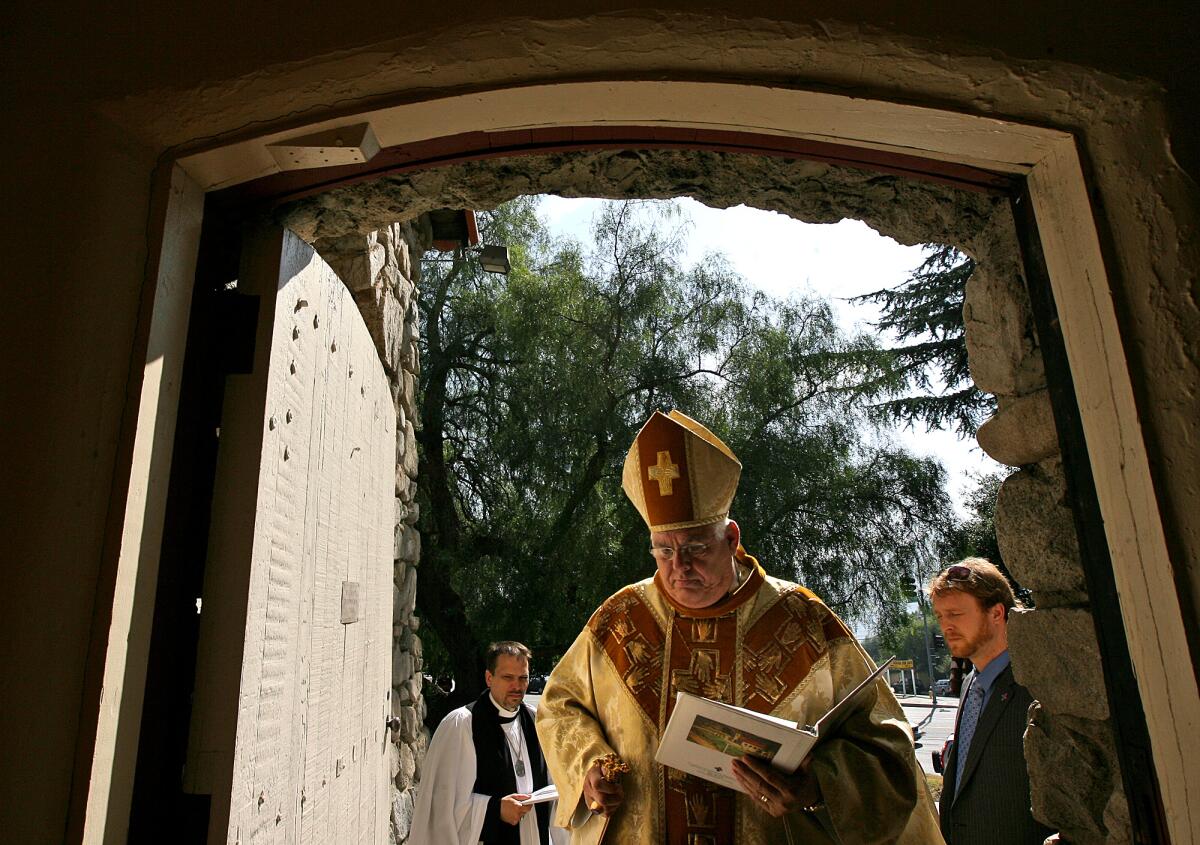J. Jon Bruno, former L.A. Episcopal bishop and crusader for the marginalized, dies

J. Jon Bruno, the former leader of the Episcopal Diocese of Los Angeles who steered the church toward a doctrine of inclusion and broke new ground on blessing same-sex unions and reaching out to economically disadvantaged communities, has died at his home in La Quinta.
An upbeat, progressive and strong-willed bishop, Bruno died Friday of natural causes, the diocese said. He was 74.
For the record:
3:54 p.m. April 29, 2021This obituary inaccurately refers to St. James Church as being a breakaway congregation at the time Bishop J. Jon Bruno tried to sell the church. St. James, which had earlier broken from the Episcopalian Diocese, had reunited with the diocese by the time Bruno tried to sell the church. Further, Bishop Taylor’s comment about drawing a line with breakaway churches was a reference to Bruno’s earlier efforts to establish legal ownership of churches that broke with the diocese.
Mayor Eric Garcetti, who continued to pray with Bruno during a weekly phone call, called the former bishop “a pillar of peace and goodwill across our city.”
“Most of all, I remember Jon’s encouragement, his love, his smile, his twinkle and his everlasting ‘yes,’” said Bishop John Harvey Taylor, who now leads the diocese. “His legacy will continue to light us along the way.”
Bruno was bishop for the six-county diocese from 2002 to 2017, a turbulent era in which he responded to the AIDS crisis by opening health clinics and welcoming LGBTQ people into the church, which he saw as a citadel for social justice and change. But a widening chasm between older conservatives and mostly younger parishioners left him battling breakaway churches that chafed at the leftward tilt of the diocese.
Taylor said Bruno had masterfully shepherded the diocese during a momentous era, running from crisis to crisis with an even hand and a desire to affirm and empower parishioners.
“Jon led with and ended with love,” Taylor said.
Later in his tenure, Bruno weathered controversy when he twice tried to sell a Newport Beach church that had broken ranks with the diocese and locked out parishioners, forcing them to hold services in a park and eventually the city’s civic center. He was hit with a three-year ministry suspension for his actions.
Born in Echo Park and raised in East L.A., Bruno had an unusual path to priesthood. A towering figure at 6-foot-5, he was a football player at Garfield High School, a starting center on the Cal State Los Angeles team and — albeit briefly — signed with the Denver Broncos, though an injury prevented him playing for the team.
He later joined the Burbank Police Department but was only 14 months into his career as a cop when he was asked to help stake out a house where a young marijuana dealer and suspected kidnapper lived. When the suspect returned home and shot at the officers, Bruno returned fire with a 12-gauge shotgun, fatally wounding the 28-year-old in the neck and chest.
Though the shooting was deemed to be justified, it left Bruno profoundly troubled and deeply conflicted. Four years later, he retired and went off to the Virginia Theological Seminary, where he earned a divinity degree. Raised a Catholic, Bruno was ultimately drawn to the Episcopalian faith out of a sense it put less emphasis on sheer obedience to the church and would better allow him to let his conscience be his guide.
“The Episcopal Church not only put their faith out there but put it into action to relieve people’s suffering and anxiety,” he told The Times in a 2006 profile.
Bruno was ordained in 1978 and served as an assistant rector in Ventura County and Oregon before being named rector of St. Athanasius in Echo Park, the oldest Episcopal church in Southern California.
When he arrived, he found a dispirited and dwindling congregation torn over the church’s direction. Bruno tried to mend the rift by involving parishioners in outreach missions, including joining forces with El Centro del Pueblo, a nonprofit that seeks to mitigate the effect of gang life.
He also became a sympathizer to those suffering the cruelties of AIDS.
When one parishioner in the throes of the disease spoke to him about the aching loneliness of having friends unwilling to have even basic physical contact with someone with AIDS, Bruno invited him to come to his office once a week — when he would give him a long hug.
Bruno also had a good-natured and playful side.
During a baptism, a young boy asked whether he could see the priest’s artificial foot, which he had worn since the limb was amputated following a severe infection. Without pause, Bruno laughed lightly, detached the device and handed the prosthetic to the youngster.
Bruno was elected bishop in 1999 and three years later became the head of the diocese, the first native Angeleno to serve in that post.
While the headlines on the long-running dispute with St. James, the Newport Beach church, may have read like a stain on Bruno’s career, Taylor said the former bishop never felt that way. He had simply drawn a line in the sand on churches trying to break from the diocese.
“It was the most difficult of Jon’s challenges,” Taylor said. “And he was at peace with it.”
Bruno is survived by his wife, Mary; a daughter, Jonelle; a son, Philip; and nine grandchildren.
More to Read
Start your day right
Sign up for Essential California for the L.A. Times biggest news, features and recommendations in your inbox six days a week.
You may occasionally receive promotional content from the Los Angeles Times.







